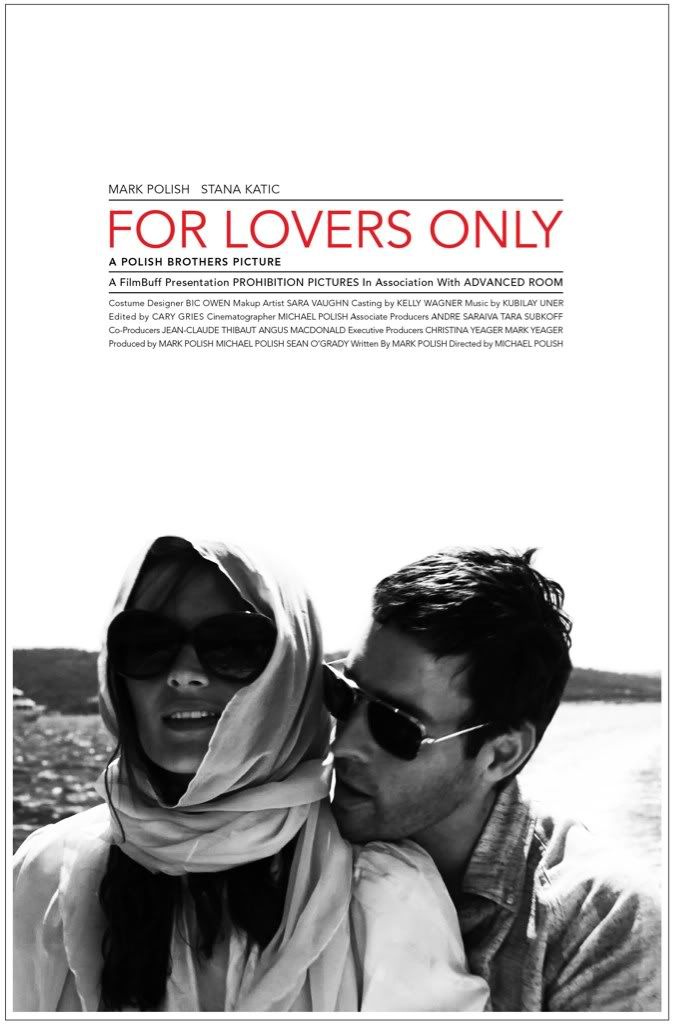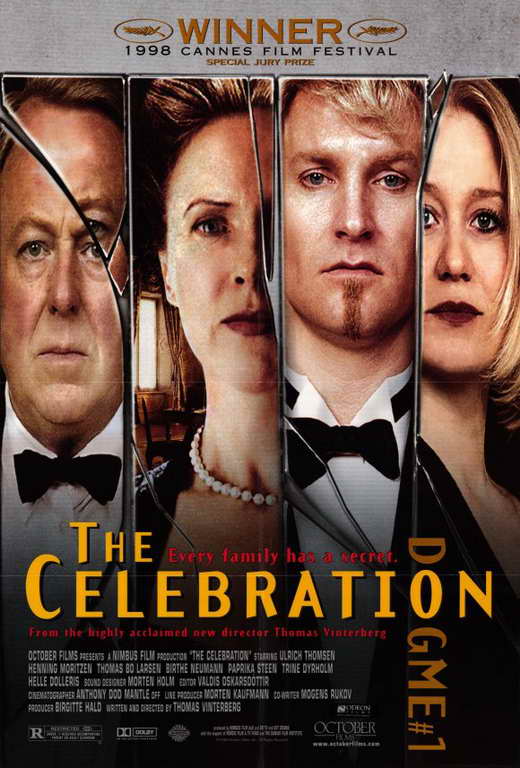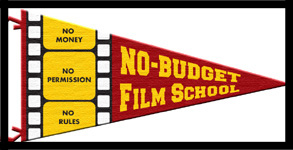|
I imagine that most people who take my "Art & Science of No-Budget Filmmaking" class already have a project that they know they want to make and because they don't have the necessary
money to make it, are trying to figure out how to make it for less. That means they're coming in with a film that should
cost, let's say $200,000, and they're trying to figure out--they're hoping I can instruct them--how to make it
for say $50,000. These numbers obviously vary, but the thought process is the same. I also imagine that for these folks,
the first couple of hours of my class may seem like a waste of time. This is the "philosophy" part. The introduction
to the introduction. The part of the cooking show where the chef tells you how he came to like the dish and the importance
of each ingredient, as opposed to cracking some eggs and sautéing some mushrooms.
Now, I will say to
those of you who have never taken my class that I DO cover the cracking of the eggs. As someone who on multiple occasions
has had to take a higher budget film and make it for considerably less, I know how to do this and I have done my best to quantify
the model so others can do it too. But I qualify all of that cramming of big round pegs into small round holes in the first
two hours of my class. I ask my students to first take that project they thought they wanted to make and put it on the shelf--at
least for a moment--and think about a new way to make movies, a way that will most likely not involve that project they walked
in with.
 | | Polish Brothers' For Lovers Only |
Of course this new way--something I call the No Budget Way--is partially a necessity. Perhaps it's
the only way for some people who have few monetary resources to make a film, any film. For those folks it's non-discretionary.
It's something you have to do, whether you like it or not. Yes, for some it is that, but really I feel like it should
be a discretionary way to make a movie for everyone. If done "properly," it should be a liberating process, the
way you would always want to make a film, though not the way you could make any and every kind of film. You couldn't
make Harry Potter using the principles of the No Budget Way. But you could, if you were the Polish Brothers for instance,
use it from time to time even when people are giving you money to make bigger films the more conventional way. Their recent
film, For Lovers Only, which they supposedly made for $0 and have already grossed $200,000 on, was pretty much made in the No Budget Way.
The NBW is a zen-like way of being, more than a set of rules. It's an optional list that puts you in the proper state-of-mind
to make something special, and to make it in a liberating way that forces you to focus on the storytelling at hand. Maybe
I can best explain it like Miles explains it to Joel in Risky Business, when he's trying to get him to loosen
up, "Joel, you wanna know something? Every now and then say, 'What the fuck.' 'What the fuck' gives you
freedom. Freedom brings opportunity. Opportunity makes your future. " The No Budget Way gives you the freedom to say
"What the fuck" and let go of things that aren't important and concentrate on the critical things that are,
(and certainly it has made the futures bright for a number of filmmakers over the years). When you have lots of money and
professionals in every position, you don't have that freedom. When it's just you and a couple of close friends and
a tiny bit of money, you're going to have to let go of something, probably a lot of things. For many this is a painful
process, but it doesn't have to be. In fact, it shouldn't be at all. It starts with something I call "Embracing
Your Limitations" and every successful micro-budget filmmaker has done this intuitively. It's allowing
yourself to let go of the things that you can't have, you can't control, and embrace the things that are most crucial
toward the success of your film. Those things are almost always just story and performances, (and often within that, truth
and authenticity). Fortunately, the American Independent Film Consortium of journalists (like those in Filmmaker Magazine
and Indiewire), film festival programmers, (especially those at top fests like Sundance and SXSW), and arthouse audiences
(for the most part), will support and reward you for doing this.
 | | Dogma #1: The Celebration |
So what is this Embracing of Limitations and what does it entail? It starts, again, with necessity. It starts with "Refusing
To Spend Money." This is the very first "rule" in my class and it sounds simple, but like breaking
up, it is oooohhh so hard to do. If you've budgeted your film for $5,000 and have $10,000, you're going to spend
the $10,000. But refusing to spend money isn't just a rule to keep you out of debt, it's there to get you into the
proper frame of mind. It allows you to Let Go. To say "what the fuck." Once you start saying "we're just
not going to spend that," you start opening up that part of your vessel where the creative energy lies. That energy
is the secret vital element of successful micro-budget filmmaking. Talent is important, but talent needs passion to create
something special. I can't tell you why someone like Francis Coppola made two or three of the greatest movies ever and
now makes shit, but I have a feeling it has something to do with this. Not spending money and figuring out another way to
do it forces you to use your imagination, and that's the part of your mind you want to use on a creative endeavor, right?
That positive energy also comes from accepting your limitations to the degree where they no longer become limitations,
but rather opportunities and maybe even advantages. I like to use the example of Dogma 95 to explain this
one. These Danish guys got together and made up a crazy set of rules to make their films by, and while it might seem impossible to make any film under these conditions, they in fact made a series
of great films under these rules. The first one, The Celebration is considered by many to be one of the best indie films of the 1990's. But most people got the lesson of their success
all wrong. They attributed it to the specific rules they laid out, rather than the fact that they chose to work with rules
at all. So a bunch of other filmmakers ran out and started making films utilizing this same set of rules, as if these were
the only rules that could generate great cinema. An interview with Lars Von Trier, the ringleader of the movement, reveals
that the rules were rather arbitrary. These filmmakers were bored with making films the same old ways and thought it would
be an interesting experiment to make them under a set of restrictive rules. They knew that these restrictions would fuel
their imagination and sure enough, great movies came out the other end. All the other stuff around the rules--the manifesto--was
just marketing and goofing around.
So, if creating rules (or restrictions) can help you make better movies,
then why use their restrictions? Jesus, People, you've already got your own! Just don't think of them as Limitations,
think of them as Rules to make your movie by. Think of conforming to these new rules as a creative experiment that feeds
your creativity and sparks your imagination.
 | | Godshaw's Lord Byron |
One of my favorite recent stories of just how to do this was demonstrated in the narrative feature Lord Byron, Zack Godshaw's no-budget film that premiered in the NEXT section at this year's Sundance Film Festival. Zack had
no money and in fact, made the film for only $700. Most people will ask, "how did you make a film for only $700?"
and I would say his answer would be "refuse to spend money." But then the astute filmmaker would follow up with,
"but how do you do that? It's just so hard to do!" Zack did something instinctively right at the beginning
that made that process much easier. Rather than sweat over which camera to use--a choice that most micro-budget filmmakers
spend waaaay too much time considering when it is in fact one of the least important decisions that they have to make--he
instead used the camera he had lying around, an old Sony Z1U. For those of you not familiar with the Z1, it was pretty much
the first HDV camera on the market, so it doesn't have a big sensor (like the 5D and 7D), it doesn't have a full-raster
HD chip, (like most new HD cameras have), it doesn't utilize solid state media, (which makes things easier to manipulate
in post) and perhaps most importantly, it doesn't shoot 24p, the crucial element that makes video look like film and has
made all this current explosion of video-shot projects viable. So, why did he choose that camera? Because he already owned
it and he knew how to use it. Done. Next! Once you make a decision like that, once you Let Go to that extent, once you
say "fuck it" (oh, sorry, "what the fuck") and give yourself that freedom, all the other decisions become
a piece of cake. We can't really pay any crew members, so how many people on the crew? Three--Zack, his producing partner
Ross, and Ross' sister Allisa . Next. No money for SAG actors? Ok, we'll use non-professional actors. Next!
A series of decisions like this not only cuts through all the mechanism that can bog you down, but also drives you
to a place where all of a sudden, you've got something pretty interesting. A completely diverse set of circumstances
and conditions that is unique to your particular movie. And the most important element of successful independent filmmaking,
the one that trumps all other elements except maybe talent, is Uniqueness. So rather than having to suffer from all these
limitations, you are now ready to revel in them, knowing that they are going to lead you to a place where no filmmaker has
gone before. And someone ask John Cooper and Trevor Groth what they're looking for in a "Sundance movie."
ARCHIVED EDITIONS OF THE NO BUDGET REPORT:
|

